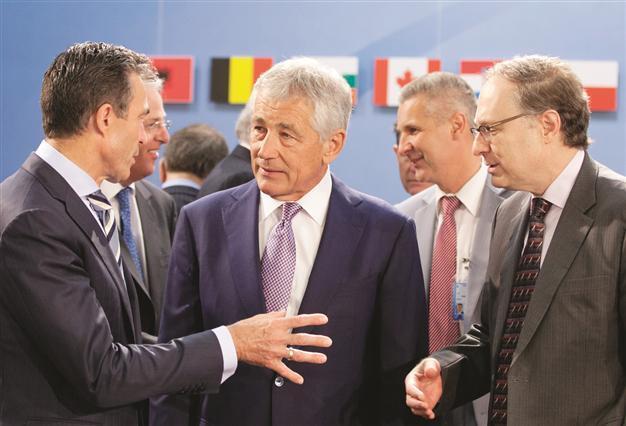NATO to set up rapid reaction teams against cyber threats
BRUSSELS

US Defense Secretary Hagel (C) chats with NATO chief Rasmussen (L) during a round table meeting at NATO headquarters in Brussels. AP photo
NATO ministers agreed June 4 to strengthen the organization’s cyber defenses and set up rapid reaction teams to help defend the military alliance against a growing number of cyber-attacks, many of them blamed on China.Last year, NATO dealt with over 2,500 “significant cases” of cyber attacks on its systems, NATO’s chief, Anders Fogh Rasmussen, said at the alliance’s first in-depth review of cyber defense, a meeting that showed how the issue has risen to the top of the security agenda.
“In the progress report we have adopted today, we agreed to establish rapid reaction teams that can help protect NATO’s own systems,” Rasmussen said. This “cyber-defense capability should be fully operational by the autumn,” Rasmussen told a press conference.
“This is a first phase. A second phase would be to look into how the alliance can respond to requests from allies who come under cyber-attack,” he said. “We are all closely connected, so an attack on one ally, if it is not dealt with quickly and effectively, can affect us all.”
The Pentagon accused China last month of using cyber espionage to modernize its military, which Beijing denied. The Washington Post said last week that Chinese hackers had gained access to designs of more than two dozen major U.S. weapons systems. U.S. President Barack Obama will tell Chinese counterpart Xi Jinping that he must deal with cyber spying and hacking of U.S. targets that originate inside his country when they meet for talks this week. China’s ambassador to the United States, Cui Tiankai, indicated that Xi would also be on the offense on the issue during the talks.
On June 1, U.S. Defense Secretary Chuck Hagel openly accused China of waging a cyber spying campaign against the United States during a security forum in Singapore.
Disagreement between members
“The United States has expressed our concerns about the growing threat of cyber intrusions, some of which appear to be tied to the Chinese government and military,” he told an annual conference. NATO members agree that the organization’s priority must be to defend NATO’s own computer networks, since these are the systems used to coordinate military operations among the allies. But there is disagreement about how the alliance should respond to requests for help from members that come under cyber attack. Smaller countries with limited resources are keen to take advantage of NATO’s cyber defense capabilities and Rasmussen believes NATO should have a capacity to help.
But larger members, such as the United States, Britain, France and Germany, disagree. Since they spend large sums on cyber defense at home, they are reluctant to divert money to NATO activities that will largely benefit others.
“NATO must not replace the will of individual members to defend themselves in [cyberspace] as in other areas,” one NATO diplomat said. Rasmussen said one option may be to use NATO’s rapid reaction teams to help countries that come under cyber attack. Another could be for one NATO member to use its own cyber capabilities to help another ally, Rasmussen said, likening this to the decision by the United States, Germany and the Netherlands to send Patriot anti-missile systems to Turkey this year. NATO was alerted to the threat of cyber attacks in 2007, when Estonia’s Internet network was paralyzed by an electronic attack that Estonia blamed on Russia. The incident prompted NATO to review its readiness to defend against cyber warfare.
Compiled from Reuters and AFP stories by the Daily News staff.
















